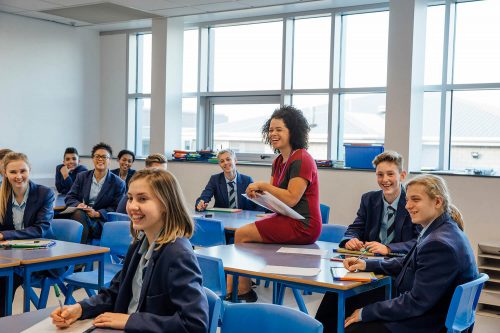The £10 million Behaviour Hubs initiative from the Department for Education is preparing to welcome its fourth cohort of Partner schools onto the programme in April 2022.
 Behaviour Hubs provides tailored support to schools and MATs to help them create calm, orderly environments where pupils can learn – and teachers can teach. This free programme matches schools that want and need to improve pupil behaviour with a Lead school that has an exemplary track record in behaviour culture.
Behaviour Hubs provides tailored support to schools and MATs to help them create calm, orderly environments where pupils can learn – and teachers can teach. This free programme matches schools that want and need to improve pupil behaviour with a Lead school that has an exemplary track record in behaviour culture.
This school-to-school support is complemented by a series of online training modules and resources developed by a team of expert behaviour advisers headed by DfE’s Tom Bennett. Applications for schools and MATs to join the April 2022 cohort are currently open.
A ‘one size doesn’t fit all’ programme
The Behaviour Hubs programme isn’t intended to make schools start again from the ground up. Instead, Lead schools help to diagnose behavioural issues and build a steady roadmap for internal behaviour improvements based around the parts of a school’s existing behaviour culture that already work.
Understanding the context and unique challenges of each Partner school is essential to the programme’s success. This means that while specific behaviour approaches, such as an outright ban of mobile phones, may be appropriate in certain contexts, this isn’t an expectation of the programme since it operates under the ethos that one size doesn’t fit all.
Supporting Covid recovery in schools
The design of the Behaviour Hubs programme has meant it is well-placed to help schools develop relevant strategies to improving behaviour culture following the disruption caused by Covid-related school closures.
Lead schools with exemplary behaviour practices host termly open days which allow Partner schools to observe a variety of approaches to sustaining effective behaviour cultures in action. Regular networking events provide a forum for schools to openly discuss the challenges they are facing, as well as share any solutions they have been developing. This idea exchange underpins the essence of Behaviour Hubs and ensures that the programme remains relevant regardless of the context.
Creating a behaviour culture across all provisions
The Behaviour Hubs programme has welcomed several exemplary special and alternative provision (AP) Lead schools, which support other special and AP schools on a one-to-one basis. A number of Lead schools on the programme also operate in challenging and disadvantaged contexts.
Special and AP schools benefit from all the same networking opportunities as other school provisions within their hub, while receiving support from a Lead school with an intimate and in-depth knowledge of improving behaviour in schools that match their own provision.
In addition to the core training modules, which are essential to the success of building sustainable behaviour practices, Behaviour Hubs offers specialist training modules that focus exclusively on behaviour management for pupils with SEND, as well as best practices in AP and special schools.
Empowering schools to make lasting changes
Consistency is a fundamental ingredient in creating an effective behaviour culture, and the programme helps schools adopt a whole-school approach that empowers staff at all levels to actively promote this culture.
The ongoing coaching provided by Lead schools builds confidence and develops the skills leaders need in order to diagnose issues, develop informed responses, drive change and continually review performance. Developing leaders in this way empowers them to develop an effective, sustainable behaviour culture beyond the life of the programme.
As such, Behaviour Hubs is as much a benefit for teachers as it is for their pupils; tackling classroom disruption facilitates higher-quality teaching which boosts teacher wellbeing, staff retention and ultimately improves outcomes for all pupils.
The Behaviour Hubs programme is currently accepting applications for the April 2022 cohort of Partner schools.
